A visitor must make clear his identity to the satisfaction of the Lodge he proposes to visit.
More than once have we been asked to explain our views as to the reception of strangers in a Lodge.
Only last week a correspondent in Australia submitted for our decision a case in which the rights of visitors were in-volved.
Hence we have thought it better to treat the matter editorially at some length. At the outset the law seems precise enough.
It is laid down, firstly:
” that no visitor shall be admitted into a Lodge, unless he is personally known, recommended, or well vouched for, after due examination, by one of the present brethren; and during his continuance in the Lodge he must be subject to the bye-laws of the Lodge. The Master of the Lodge is bound to enforce these regulations.”
In the next place:
” it is within the power of the Master, Wardens, and brethren of every private Lodge to refuse admission to any visitor of known bad character.”
And finally:
” a brother, who is not a subscribing member to a Lodge, shall not be permitted to visit any Lodge in the town or place where he resides more than once during his secession from the Craft.”
There is nothing doubtful in these [UGLE c1875] regulations.
In the first place the Masonic character of the visitor must be proved. Then the authorities of a Lodge may exclude a visitor who is of known bad character, and, finally, if the visitor is not a subscribing member to any Lodge he can only exercise his right of visitation at any Lodge once during his secession.
The terms, then, of the law are defined strictly, yet in practice there is a divergence of opinion as to its application.
Some hold that every Master Mason who is a subscribing member of a Lodge, duly constituted, can exercise his right without restriction, while others regard the exercise of the right with jealousy.
The late Dr. Oliver, than whom we imagine no Masonic writer ever existed who takes a more liberal view of the rights and privileges of Masonry, devotes several pages in his Masonic Jurisprudence to the consideration of this question, and, like all liberal-minded men, he treats the matter in a broad common sensible point of view.
There is no one in fact whose dicta on this or any other subject are more worthy of our respect, and accordingly we do not hesitate to pin our faith to his most lucid exposition.
We make this admission the more readily that we find our esteemed Brother Chalmers I. Paton proposes the same, or at all events, very similar views. Here then is what the late Bro. Oliver says.
The laws, he points out, are stringent, but it is often found to be expedient to relax this stringency.
A visitor must make clear his identity to the satisfaction of the Lodge he proposes to visit.
He must show that he is a subscribing member of some regular Lodge. If not known, or recommended by any well-known brother, he must submit himself for examination by some experienced member, and having given satisfactory evidence of his Mason hood, he then becomes eligible for admission into the Lodge during the transaction of Masonic business.
But clearly the right should be exercised with discretion, while the propriety of the restriction imposed bylaw is self evident.
A Mason, for instance, who is not a sub-scribing member of any Lodge, yet claims to exercise this right of visitation, evades the most important of his Masonic duties.
He will attend a Lodge without contributing to its expenses, and will be a burden to the brethren who compose it.
Again, a Mason who happens unfortunately to be on unfriendly terms with any member of a Lodge should clearly not press his claim to admission, for in such case he would destroy that harmony which it is the aim of Masonry to establish.
Certainly, if of two members of a Lodge, whose relations towards each other are unfriendly, it is desirable that one should avoid being present, it is still more important that a visitor whose unfriendliness towards some member is established, should forego his right of visitation.
He makes no sacrifice by doing so, while, on the other hand, his insistence virtually deprives the member affected of his rights of membership.
Again, no brother should press his claim to be present when the private business of the Lodge is under discussion.
To do so were in the highest degree indelicate. The privacy of a Lodge should no more be invaded than the privacy of an individual.
Our late Bro. Oliver mentions that at a Quarterly Communication held in 1819, a report from the Board of General Purposes was read, in which it was stated that a complaint had been submitted to them to the effect that certain brethren, though well known, had been refused admission to a certain Lodge in London, on the ground that a candidate was about to be initiated, and the Board laid it down that it was the inherent right of every Mason, who is known or vouched for, to visit any Lodge during the time it is open for the transaction of Masonic business, but ” notwithstanding this resolution,” writes Dr. Oliver, ” there are Lodges which refuse admission to visitors when practising the ceremonies of any of the degrees, although such exclusion is undoubtedly illegal.”
The writer adds, ” It was the declaration of a late Grand Master (when the subject was brought under his consideration) that a Mason’s Lodge is a Mason’s Church ; and that no qualified brother could be legally refused admittance under any circumstances ; this, then, is a landmark which ought to be reverenced.”
And Bro. Paton remarks, in his Freemasonry and its Jurisprudence, ” Masonic Jurists have always decided that the right of visitation is absolute and positive, and inures to every Mason in his travels through out the world. Wherever he may be, however distant from his residence, and in the land of the stranger, every Lodge is, to a Mason in good standing, his home, where he should be ever sure of the warmest and truest welcome.”
He further states, ” In concluding this section, it may be remarked, by way of recapitulation, that the right of visit is a positive right, which inures to every unaffiliated Master Mason once, and to every affiliated Master Mason always ; but that it is a right which can never be exercised without a previous examination and legal avouchment, and may be forfeited for good and sufficient cause; while, for the Master of any Lodge to deny it, without such cause, is to do a Masonic wrong to the Brother claiming it, for which he will have his redress upon complaint to the Grand Lodge within whose jurisdiction the injury is inflicted.
This, it appears, is now the settled law upon the subject of the Masonic right of visit, while the exposition both by Oliver and Paton is sufficiently perspicuous.
Nor will any of our readers, we imagine, doubt the wisdom of the restrictions imposed.
And after all, no difficulty need ever occur if brethren will only exercise common sense and that kindly feeling which should animate all gentlemen in their dealings one with another.
Visiting a Lodge is like visiting a house, and must be governed by the same unwritten code of laws.
No gentleman is ever wittingly guilty of intrusion into company where his presence is undesired or undesirable.
To claim a right on all occasions merely because it exists, is not gentlemanly, and therefore not Masonic.
In order to be a Mason, a man must first be a gentleman, not in the mere conventional sense which is usually assigned to the word, but a gentleman in its widest and fullest significance.
We feel convinced no Worshipful Master, with a sense of the proprieties, would close the doors of his Lodge against any strange brother who had established his character as a Mason, nor would a Mason, worthy of the name, seek to thrust himself into any Lodge where his presence would be obnoxious.
The right to visit is a landmark of our Order. There strictions on such right are only such as wisdom and policy must dictate.
But in claiming or denying it, we must be governed, after all, by prudence and common sense.
The cases in which a refusal is likely to be met are few and far between, but numerous or the reverse, they can only be determined by the proprieties of time, place, and circumstance
 The Freemasons Chronicle, a weekly record of masonic intelligence, was first published 2nd January 1875 London, England as an independent weekly journal of masonic interest and continued for 27 years.
The Freemasons Chronicle, a weekly record of masonic intelligence, was first published 2nd January 1875 London, England as an independent weekly journal of masonic interest and continued for 27 years.
It should be the business of a journal devoted to the interests of the Order to attempt the removal of prejudices such as these, which, though they may have little perceptible influence upon the prosperity of the Fraternity, yet have the effect of preventing timid or ill-informed persons from enlisting under its banner.
It will not only attempt to keep pace with the growing literary requirements of the day, but it will seek to exhibit the Order to the non-Masonic world divested of its technical details, and clothed in the garb of Charity and Brotherly Love.
The questions of the hour, which exercise the minds of thoughtful men, will be handled freely and broadly, without any tinge of political or sectarian bias.
The memoranda of Masonic gatherings which will appear from week to week, will be full and accurate; and as free interchange of opinion is one of the best signs of life and vigour in any society, ample scope will be given for Correspondence on topics of interest to the Order.
If we may venture upon a new rendering of words which recent events have made memorable, we will say here, once and for all, that we will be keen men of business, and will spare no effort, consistent with honour, to achieve commercial success; but first, and before all things, we will prove to our brethren and the world that we are FREEMASONS.
Recent Articles: The Freemason's Chronicle
 Operative And Speculative Masonry Explore the fascinating transition from Operative to Speculative Masonry in our latest post. Discover historical insights from Augustus C. L. Arnold and Rev. Wm. P. Strickland, shedding light on Freemasonry's evolution and its enduring principles. Dive into the rich history and significant milestones that shaped modern Freemasonry. - The Freemason's Chronicle - 2 September 1876 |
 Discover the true essence of Freemasonry, an ancient order founded on the profound principles of love for God and man. It's a call to rise above mere appearances, to embody genuine virtue and benevolence, transcending societal pretense. Embrace the transformative power of simplicity, and let the authentic glories of Freemasonry inspire your path. |
 Discover the intriguing story of a man who became a Mason but openly professed his dislike for the institution. Unravel the peculiar circumstances that led him down this path and explore the unexpected consequences that followed. Dive into this thought-provoking account that challenges our notions of loyalty and reveals the complexities of human nature within the Masonic fraternity. |
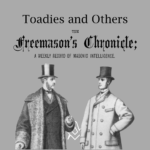 In the realm of Masonry, the principles of equality and respect are paramount. Yet, the presence of toadies—those who obsequiously seek favour from the influential—threatens these ideals. While Masonry embraces diverse beliefs and backgrounds, it rejects the sycophantic behaviours of toadies, flunkeys, and tuft-hunters, urging members to uphold genuine respect and self-worth. The Freemason's Chronicle - 22nd January 1876 |
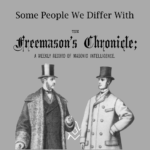 Unveiling the Unpleasant: Some People We Differ With Discover the intriguing dynamics of quarrels within the Masonic brotherhood. From the cantankerous to the litigious, the peevish to the vengeful, delve into the characters that challenge fraternal harmony. Explore their motives, temperaments, and the art of navigating disputes with these fascinating brethren. Brace yourself for a riveting journey into the world of conflicting personalities. |
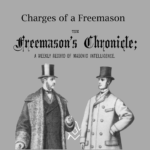 Unravelling the Masonic Mystique: A Deep Dive into the Freemasons' Charges - Explore the intricate world of Freemasonry, its principles, rituals, and the mechanisms for resolving internal disputes. Discover how this ancient fraternity fosters unity, promotes moral conduct, and upholds the sanctity of its secrets, while navigating the complexities of modern society. - The Freemason's Chronicle - 4 December 1875 |
 Unlock the hidden lessons of Masonic Studies! Don't settle for superficial knowledge or mere rituals. Discover the true depth and meaning behind Freemasonry. Expand your understanding of Tracing-Boards, Lectures, and more. Join regular Lodges of Instruction to enhance your Masonic journey. Become a knowledgeable Freemason, not just a token-bearer. Unleash the power of true Masonic wisdom today! |
 Uncover the incredible story of how Masonry saved the life of a Crimean War foot soldier in this historical and masonic account. Through the first hand experience of a soldier engaged in fierce hand-to-hand combat, witness the fateful encounter with a Russian Freemason that changed the course of his life. Learn how brotherhood and a deep dedication to the craft can lead to unforeseen and life-saving circumstances on the battlefield. |
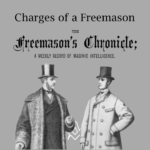 The Freemason's Chronicle - Charges of a Freemason The secrets of Masonry are the exclusive property of the Craft, and can never be communicated to one who is a mere labourer and not an accepted Mason. Hence, no labourer, that is, one who has not been regularly initiated in a legal Lodge. Article first published in The Freemason's Chronicle, 27 November 1875 |
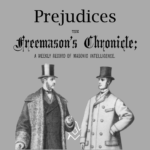 The Freemason's Chronicle - Prejudices Prejudices are partial judgments in favour of, or against certain persons or things, and, for convenience sake, may be ranged in two categories—those which are, comparatively speaking, harmless, and those which are harmful. Article first published in The Freemason's Chronicle, Oct. 2 1875. |
 The Freemason's Chronicle - Cliques Is Freemasonry - a Clique ? Man has been defined as a gregarious animal, but in his highly civilised condition he is gregarious only to a limited extent. First published in The Freemason's Chronicle, Oct. 2 1875, addresses the same challenges then as now. |
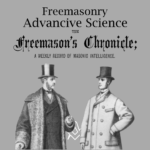 The Freemason's Chronicle - Freemasonry - an Advancive Science Is Freemasonry - an Advancive Science ? Not to confuse advancement with innovation. Has it been the case that Freemasonry's survival for 300 years plus is due to being an Advancive Science, tending to advance. First published in The Freemason's Chronicle 18 September 1875, addresses the same challenges then as now. |
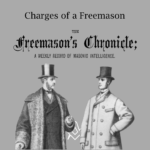 The Freemason's Chronicle - Charges Of A Freemason An interpretation of the "Charges of a Freemason", written Bro. Cornelius Moore and published in 1875, that introduce certain opinions that for some readers, will not sit well in contemporary times. - The Freemason's Chronicle, Sept. 11, 1875 |
 On The Order Of The Temple And Its Doctrine. THE Order of the Temple is divided into two great classes, denominated respectively the Order of the Temple and the Eastern Order. The Eastern Order gave birth to the Order of the Temple, and in the course of time has become an appendage of the latter. It is in ancient Egypt that we find the cradle of the Eastern Order. The Freemason's Chronicle, Sept. 4, 1875 |
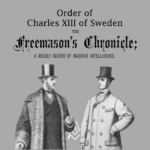 Order of Charles XIII of Sweden The following translation of the Manifesto of King JL Charles XIII of Sweden, on the occasion of his establishing the Masonic Order which bears his name, and of the Statutes of the said Order, may be interesting to our readers. The Freemason's Chronicle, Aug. 28, 1875 |
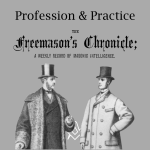 Most of our readers in the course of their experience, have doubtless met with enthusiastic brethren who take it for granted that a Mason can do no wrong. These enthusiasts are thoroughly convinced that the vast majority of those who join the Order are the most benevolent, the most moral, and the very noblest members of society. - The Freemason's Chronicle 10 July 1875 |
 An article investigating the relationship between masonry and citizenship. Are the principles of Freemasonry aligned with the freemason's claim to be a better citizen of the world? The Freemason's Chronicle - 19 June 1875 |
 A visitor must make clear his identity to the satisfaction of the Lodge he proposes to visit. More than once have we been asked to explain our views as to the reception of strangers in a Lodge. - The Freemason's Chronicle - 29 May 1875 |
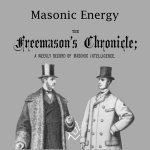 Is there reason in the accusation that Masonic energy looks only to a course of good feeds, when we can point to such grand results as have been achieved in these latter years, both in respect of the extension of our Order ? - 1May 1875 |
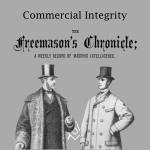 Implementing Freemasonry's peculiar system of morality in our day to day business affairs was the topic of this article, Commercial Integrity, first published in The Freemason's Chronicle - 8 May 1875 |
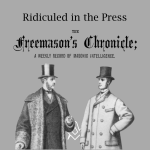 Ridicule has been somewhat illogically described as the test of truth. If it were so, Freemasonry ought to have perished long since. Two press reports from May 1875 covering the |
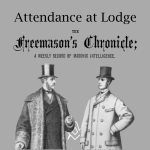 There are many things which Freemasonry will do for a man in the way of opening his mind and giving him larger and kindlier views of life, but Freemasonry itself, cannot eradicate the natural bias of the disposition. |
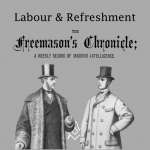 There is, we fear, too marked a tendency in very many Lodges to hasten through its labours, with a view to entering, as soon as possible, upon the business of refreshment. - The Freemason's Chronicle 17th April, 1875 |
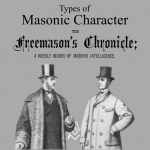 Another example that demonstrates that nothing really changes in Freemasonry. In an article the Types of Masonic Character published 145 years ago in The Freemason's Chronicle 10th April, 1875 |
 A brief history on the relationship between the British Monarchy and the craft - The Freemason's Chronicle 20th March , 1875 |
 What are the qualities of a convivial man and how does this dovetail perfectly in to Freemasonry ? 16th March, 1875 |
 A review of the "Sketch for the History of the Dionysian Artificers," a fragment, by Hyppoli to Joseph Da Costa - This little work may be regarded as, so to speak, the Holy Grail of Masonry. |
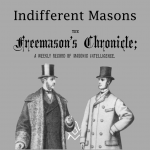 Nothing really changes, an article Indifferent Masons, From Le Monde Maçonnique 1874. Translation published in The Freemason's Chronicle 20th February, 1875 |
 In handling an intruder in the lodge, we endeavoured to show that a good Mason should be a gentleman, and a sincere man. The Freemason's Chronicle 20th February, 1875 |
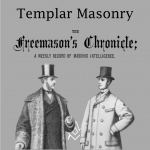 Templar Masonry - a historical aspect of the Religious and Military Order of the Temple published in The Freemason's Chronicle 13th February, 1875 |
 Secrecy perhaps the strongest objection urged by the enemies of the Masonic Order against its existence published in The Freemason's Chronicle 20th March 1875 |
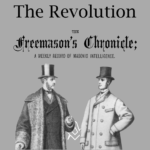 Freemasonry In The United States during And After The Revolution We take a look at Freemasonry in the United States during and after the Revolution first published in The Freemason's Chronicle - February 6, 1875 |
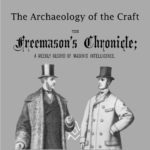 We take a look at the archaeological connection with the Craft, first published in The Freemason's Chronicle - January 30, 1875 |
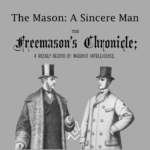 What it means to a Freemason to be a sincere man. Extract: first published in The Freemason's Chronicle - January 23, 1875 |
 What it means to a Freemason to be a citizen of the world ? First published in The Freemason's Chronicle - January 16, 1875 |
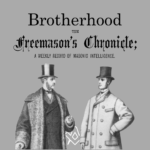 Brotherhood! In that one word what sympathetic associations arise. First published in The Freemason's Chronicle - January 9, 1875 |
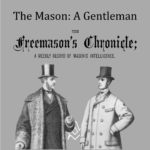 This opening article was written 145 years ago, yet it resonates with Freemasons today as it did then. First published in The Freemason's Chronicle, January 2, 1875, Issue 1 |
masonic knowledge
to be a better citizen of the world
share the square with two brothers

click image to open email app on mobile device









